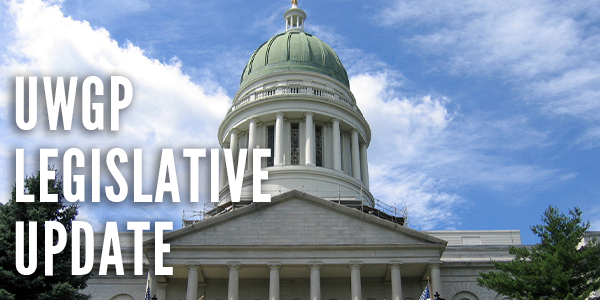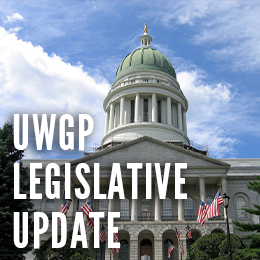LEGISLATIVE UPDATE
March 13, 2020
Dear Community Advocate,
Welcome to a new month of advocacy updates and news from our community and the state. This week’s update includes the debut of our latest advocacy mini-feature, Greg’s MaineCare journey, an update on Public Law 154 , highlights from Augusta, and the Bill Watch list.
Thank you for continuing to use your voice to advocate for the education, financial stability, and health of all neighbors throughout the Greater Portland region.
If you would like to join our growing list of advocates and receive the bi-weekly Legislative Update, sign up below.
IN THIS ISSUE
This update includes:
- No on 1 update
- MAINECARE video debut
- HIGHLIGHTS from Augusta
- LINK to UWGP’s Legislative Rewind
- A MAINE BILLS watch list
NO ON 1 UPDATE
On Tuesday, March 3, more than 379,000 Mainers voted on a Citizens Veto that aimed to repeal Public Law 154. 73% voted not to reinstate the religious and philosophical exemptions for school vaccinations. In Cumberland County, the vote was higher; 83% voted no on Question 1. What makes this public health victory so significant is that high exemption rates put our state’s most vulnerable and immunocompromised citizens (largely young children and the elderly) at risk of being infected by preventable diseases.
Click here to read more about Public Law 154.
HOW MAINECARE CHANGED GREG’S LIFE
When we mobilize the caring power of community via advocacy, amazing things happen. We have seen how your efforts to inform your personal networks on important issues and to communicate with your representatives yield incredible results. Whether it is increasing access to farmers’ markets for struggling families, increasing incentives to build more affordable housing, or expanding access to MaineCare for folks trying to get on their feet, your advocacy has changed lives for the better. Our work advocating for an expansion of MaineCare, along with the advocacy efforts of many individuals and organizations across the state, has saved lives.
Greg is one person of many who saw their lives improve with access to MaineCare.
HIGHLIGHTS FROM AUGUSTA
LD 1760
An Act To Support Children’s Healthy Development and School Readiness
This bipartisan bill proposes to launch up to 10 First 4 ME pilot sites under the Maine Department of Health and Human Services that would serve at-risk children under 6 years of age who have not yet entered kindergarten and their parents. The bill funds projects that integrate comprehensive resources and services into traditional center-based and family child care settings. The resources can include family supports, such as home visiting services. This bill also provides for increasing child care providers’ knowledge, parent engagement and communication, and wraparound supports such as nutrition, mental health services, and connections to other community services as needed.
This bill, which is endorsed by the Thrive2027 Council, speaks directly to mitigating Adverse Childhood Experiences (ACEs) by taking a comprehensive approach to supporting families with young children based on a model that is proven to work. It was recently voted out of the Health and Human Services Committee and there is still time to encourage your state legislator to support this important bill: text ME CHILD to 52886 or click here to advocate now.
ADVOCATE FOR MAINE CHILDREN NOW
LD 1919
An Act To Provide Compensation to Family Caregivers
This bipartisan bill creates a new Caregiver Credit, which would put cash in the pockets of unpaid caregivers, compensating those with low- to moderate-incomes for their hard work and the important role they play in meeting the state’s unmet need for care. The Caregiver Credit established in LD 1919 provides a refundable Maine income tax credit of up to $2,000 for low- to moderate-income households that provide unpaid care to eligible family members. Because the credit would be refundable, most eligible families with low incomes would receive a cash refund when they file their state income taxes. Much like the Earned Income Tax Credit (EITC), the Caregiver Credit seeks to put more cash in the hands of struggling families. Even though the bill was unanimously voted out of the Taxation Committee, there is still time to encourage your legislator to support this important bill. Click here to advocate for LD 1919 now.
ADVOCATE FOR FAMILY CAREGIVERS
LEGISLATIVE REWIND
Our Legislative Rewind podcast features a recap of our list of bills to watch and a deep dive conversation with Representative Maureen Terry and Amy Larkin, a Maine resident, discussing tax benefits like the expanded State Earned Income Tax Credit (EITC) and the proposed Caregiver Tax Credit.
Click here to listen to the Legislative Rewind Podcast.
Maine Bills to Watch
UWGP has embraced Thrive2027, our community’s 10-year effort to achieve measurable progress in the areas of education, financial stability, and health. UWGP is playing its part to ensure the success of Thrive2027 by supporting public policy like those included in the following Legislative Watch List:
L.D. 1096: “An Act To Require That Comprehensive Substance Use Disorder Treatment Be Made Available to Maine’s Incarcerated Population”
This bill requires the Commissioner of Corrections to establish and maintain a substance use disorder treatment program in correctional facilities, which must provide for an assessment on intake, a variety of behavioral and medication-assisted treatment options, and peer support and comprehensive treatment options after release. There was a work session on March 9 and a vote of Ought Not To Pass.
L.D. 1466: “An Act To Allow Community-based Organizations To Participate in Diversion Projects for Persons with Substance Use Disorder”
This bill amends the Substance Use Disorder Assistance Program, which provides grants to municipalities, counties, and regional jails to carry out projects designed to reduce substance use, substance use-related crimes, and recidivism, to include community-based organizations as entities eligible for grants under the program. A work session was held on January 27.
L.D. 1572: “An Act To Enact the Maine Fair Chance Housing Act”
This bill establishes the Maine Fair Chance Housing Act, the purpose of which is to ensure that a person is not denied housing based solely on the existence of a history of criminal convictions. There was a work session and vote on March 12 resulting in a Divided Report.
L.D. 1607: “An Act To Create the Department of Early Care and Learning”
This concept bill proposes to create the Department of Early Care and Learning as a cabinet-level state agency within the executive branch of state government. It was voted Ought Not To Pass on February 6.
L.D. 1645: “An Act To Create Affordable Workforce and Senior Housing and Preserve Affordable Rural Housing”
This bill seeks to expand affordable housing for seniors and rural communities. The Governor signed this into law on February 12.
L.D. 1760: “An Act To Support Children’s Healthy Development and School Readiness”
This bill would help mitigate ACEs by increasing access to high-quality childcare for at-risk children under 6 years old and provide other wraparound supports to their families. There was a packed house at the public hearing on February 13, but there is still time to encourage your state legislator to support it. Text ME CHILD to 52886 and follow the link when prompted. It takes less than a minute!
L.D. 1919: “An Act To Provide a Tax Credit for Family Caregivers”
This bill creates a refundable credit for those taxpayers caring for an elderly and/or disabled family member. There was a public hearing on February 6. Text ME CREDIT to 52886 and follow the link when prompted. It takes less than a minute!
L.D. 1935: “An Act To Address the Needs of Pregnant Women Affected by Opioid Use Disorder”
This bill increases and funds treatment options specifically for pregnant women who use opioids and wish to seek treatment. On February 14, the Health and Human Services Committee voted Ought Not To Pass.
L.D. 1974: “An Act To Promote Telehealth”
This bill provides for reimbursement of case management services delivered through telehealth to targeted populations. A public hearing was held on January 22. There was a work session February 27 and March 11. It was voted Ought to Pass as Amended.
L.D. 2056: “Resolve, To Create the Frequent Users System Engagement Collaborative”
This bill is designed to pull all our expensive emergency systems together to house people experiencing chronic and long-term homelessness, one at a time. Once people are housed, they stop ricocheting through our most expensive systems. This eventually changes the way we help people who are ill and have no place to live while realizing considerable savings of public funds. On February 27 the bill was unanimously voted out of the Health and Human Services Committee.
Looking for a little more analysis on these bills? Click here to stream our Legislative Rewind podcast.
Thank you for raising your hand and offering your support as a volunteer, donor, and advocate. Together we are creating a community where everyone can thrive – where we are all committed and passionate about making Greater Portland even greater.
SUBSCRIBE
If you are not currently subscribed and want to receive the bi-weekly Legislative Update delivered to your inbox, please fill out the form below. To connect directly with our Director of Public Policy & Advocacy, please contact advocacy@unitedwaygp.org.
To lend your support and help further policies and legislation that will further the goals of Thrive2027, invest in the community through United Way of Greater Portland.

